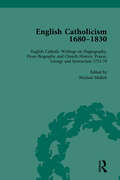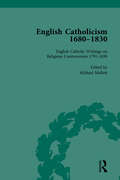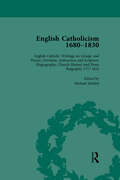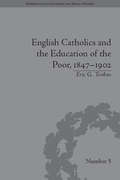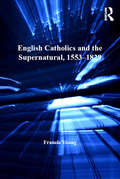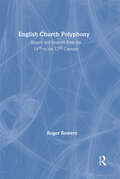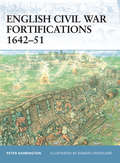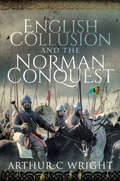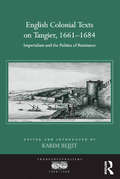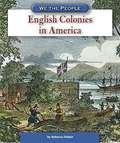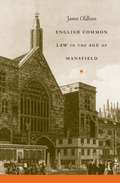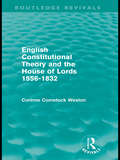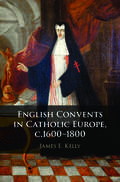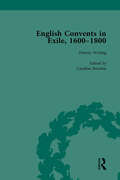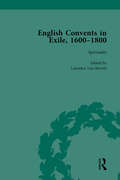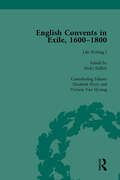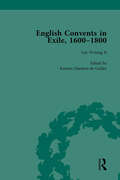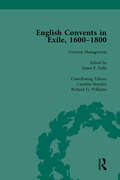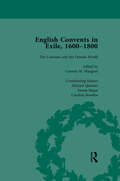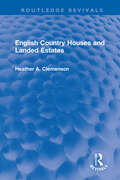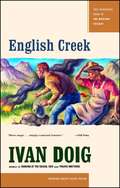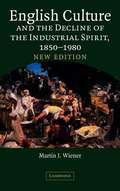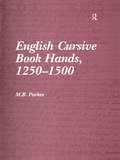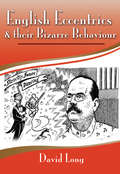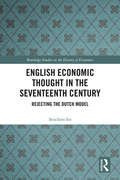- Table View
- List View
English Catholicism, 1680-1830, vol 4
by Michael MullettOffers a collection of English-language Catholic literature covering the long eighteenth century. This book focuses on the periods of martyrdom and violent persecution from the end of the sixteenth to the end of the seventeenth centuries and, latterly, on the so-called 'Second Spring' of English Catholicism.
English Catholicism, 1680-1830, vol 5
by Michael MullettOffers a collection of English-language Catholic literature covering the long eighteenth century. This book focuses on the periods of martyrdom and violent persecution from the end of the sixteenth to the end of the seventeenth centuries and, latterly, on the so-called 'Second Spring' of English Catholicism.
English Catholicism, 1680-1830, vol 6
by Michael MullettOffers a collection of English-language Catholic literature covering the long eighteenth century. This book focuses on the periods of martyrdom and violent persecution from the end of the sixteenth to the end of the seventeenth centuries and, latterly, on the so-called 'Second Spring' of English Catholicism.
English Catholics and the Education of the Poor, 1847–1902 (Perspectives in Economic and Social History #5)
by Eric G TenbusFilling an important gap in the historiography of Victorian Britain, this book examines the English Catholic Church's efforts during the second half of the nineteenth century to provide elementary education for Catholics.
English Catholics and the Supernatural, 1553–1829 (Catholic Christendom, 1300-1700)
by Francis YoungIn spite of an upsurge in interest in the social history of the Catholic community and an ever-growing body of literature on early modern 'superstition' and popular religion, the English Catholic community's response to the invisible world of the preternatural and supernatural has remained largely neglected. Addressing this oversight, this book explores Catholic responses to the supernatural world, setting the English Catholic community in the contexts of the wider Counter-Reformation and the confessional culture of early modern England. In so doing, it fulfils the need for a study of how English Catholics related to manifestations of the devil (witchcraft and possession) and the dead (ghosts) in the context of Catholic attitudes to the supernatural world as a whole (including debates on miracles). The study further provides a comprehensive examination of the ways in which English Catholics deployed exorcism, the church's ultimate response to the devil. Whilst some aspects of the Catholic response have been touched on in the course of broader studies, few scholars have gone beyond the evidence contained within anti-Catholic polemical literature to examine in detail what Catholics themselves said and thought. Given that Catholics were consistently portrayed as 'superstitious' in Protestant literature, the historian must attend to Catholic voices on the supernatural in order to avoid a disastrously unbalanced view of Catholic attitudes. This book provides the first analysis of the Catholic response to the supernatural and witchcraft and how it related to a characteristic Counter-Reformation preoccupation, the phenomenon of exorcism.
English Church Polyphony: Singers and Sources from the 14th to the 17th Century (Variorum Collected Studies)
by Roger BowersThe theme of the essays in this volume is the identification of the resources which between c.1320 and 1642 the English church saw fit to provide for the performance of the music of its liturgy. Individual essays describe the music and the choirs of Canterbury and Lincoln Cathedrals, Winchester Cathedral Priory and the private chapel of Cardinal Wolsey, while the personnel of the chapels of Edward III, the Black Prince and John of Gaunt emerge from study of the texts of compositions of the 14th century. From the alignment of contemporary musical and archival sources there arises a web of conclusions relating to the size of ensemble, vocal scoring and sounding pitch envisaged by its composers for English church polyphony of the period c.1320-1559. These essays thus encompass the two most profound of the revolutions to which the music of the English church was subject at this period: the inauguration and widespread adoption of choral polyphony in the years c.1455-85 and the liturgical and doctrinal Reformation of 1547 to 1563.
English Civil War Fortifications 1642-51
by Peter Harrington Donato SpedaliereThe techniques of European warfare were transformed during the 15th and 16th centuries by the use of gunpowder and by substantial progress in the effectiveness and destructive power of artillery. The series of conflicts in the 1640s, known collectively as the English Civil War, was the first in the British Isles that reflected this new reality. Sieges that aimed at isolating and reducing fortified places became the dominant instrument for prosecuting the war and protective fortifications were vital, for both the besieged as well as the besieger. This title describes how both the Parliamentarians and the Royalists made use of new fortification techniques throughout the course of this conflict.
English Collusion and the Norman Conquest
by Arthur Colin WrightA historical analysis of the warfare during the Norman Conquest of England, and a look at the truth behind the legendary victor, King William I.The reality of war, in any period, is its totality. Warfare affects everyone in a society. Here, for the first time, is a comprehensive analysis of eleventh century warfare as exposed in the record of the Norman Conquest of England. King William I experienced a lifetime of conflict on and off so many battlefields. In English Collusion and the Norman Conquest, Arthur Wright’s second book on the Norman Conquest, he argues that this monarch has received an undeserved reputation bestowed on him by clerics ignorant alike of warfare, politics, economics and of the secular world, men writing half a century after events reported to them by doubtful sources. How much of this popular legend was actually created by an avaricious Church?Was he just a lucky, brutal soldier, or was he instead a gifted English King who could meld cultures and talents? This is a tale of blood, deceit, ambition and power politics which pieces together the self-interested distortion of events, brutalizing conflict and superb strategic acumen by using and analyzing contemporary evidence the like of which is not to be found elsewhere in Europe.By 1072 King William should have been secure upon the English throne, so what went wrong? How did a Norman Duke and a few thousand mercenaries take and hold such a wealthy and populous Kingdom? Even in the “Harrowing of the North,” which probably saw the death of tens of thousands, who was really to blame and why did it happen?Praise for English Collusion and the Norman Conquest“Arthur C Wright’s fresh look at how things panned out before and after the invasion provides new and fresh evidence that should not be overlooked. Brilliant.” —Books Monthly (UK)
English Colonial Texts on Tangier, 1661-1684: Imperialism and the Politics of Resistance (Transculturalisms, 1400-1700)
by Karim BejjitRecent years have seen growing academic interest in England’s colonial venture in Tangier in the late seventeenth century, and the crucial role it played not only in influencing contemporary domestic politics in England, but also in shaping new imperial policies in the Mediterranean. This critical edition presents a remarkable collection of 18 Restoration pamphlets dealing with the English occupation of Tangier. In an extensive original introduction, Karim Bejjit narrates the various stages of the colonial venture in Tangier, and critically analyses both the British historiography and current scholarship on the subject. He provides an alternative reading of the Tangier episode, emphasising the Moroccan point of view and the significance of the local political agency. At the same time, as the author argues in the introduction, so intertwined were the affairs of the colony and the home country in 1680 that the political crisis which was then unfolding in England cannot be fully explained without acknowledging the impact of dramatic developments in Tangier. Despite their generic diversity, as Bejjit shows, the pamphlets in this collection share a common interest in the affairs of Tangier, and reflect the changing circumstances and shifting politics at home and in the colony. In bringing together these long forgotten narratives, this edition revives critical interest in the colonial adventure in Tangier which had considerable influence on the political scene in England. Read collectively, the texts offer a genuine glimpse into the colonial scene and the interplay of forces which governed English presence in Tangier.
English Colonies In America (We the People)
by Rebecca Love FishkinSeeking to compete with its rivals Spain and France for a presence in North America, England established its first settlement in Jamestown, Virginia, in 1607. England wanted permanent colonies for long-term wealth, as well as a place to send people who disagreed with the king's religion and politics. England's 13 North American colonies were established over a period of 126 years. Though all were clustered along the Atlantic coast, they supported different types of lifestyles based on factors such as geography and religion. Though different, the colonies eventually united in their anger toward repressive English rule, igniting the revolution that led to the formation of the United States of America.
English Common Law in the Age of Mansfield
by James OldhamIn the eighteenth century, the English common law courts laid the foundation that continues to support present-day Anglo-American law. Lord Mansfield, Chief Justice of the Court of King's Bench, 1756-1788, was the dominant judicial force behind these developments. In this abridgment of his two-volume book, The Mansfield Manuscripts and the Growth of English Law in the Eighteenth Century, James Oldham presents the fundamentals of the English common law during this period, with a detailed description of the operational features of the common law courts. This work includes revised and updated versions of the historical and analytical essays that introduced the case transcriptions in the original volumes, with each chapter focusing on a different aspect of the law.While considerable scholarship has been devoted to the eighteenth-century English criminal trial, little attention has been given to the civil side. This book helps to fill that gap, providing an understanding of the principal body of substantive law with which America's founding fathers would have been familiar. It is an invaluable reference for practicing lawyers, scholars, and students of Anglo-American legal history.
English Constitutional Theory and the House of Lords 1556-1832 (Routledge Revivals)
by Corinne WestonFirst published in 1965, this work studies the House of Lords and the various proposals for its reform, abolition or limitation of its powers which have been made in the light o f prevailing theories of the nature and characteristics of the English government. The work also contains a history of the theory of mixed government that arose in Tudor England and lasted until well after the Reform Act of 1832. This history both illuminates the position of the House of Lords and also provides perspective for the study of Democracy in the movement for parliamentary reform. One of the book's most original features is an extensive account of Charles I's Answer to the Nineteen Propostions, out of which came the startling new theory of the constitution, known as "mixed monarchy".
English Convents in Catholic Europe, c.1600–1800
by James E. KellyIn 1598, the first English convent to be founded since the dissolution of the monasteries was established in Brussels, followed by a further twenty-one foundations, which all self-identified as English institutions in Catholic Europe. Around four thousand women entered these religious houses over the following two centuries. This book highlights the significance of the English convents as part of, and contributors to, national and European Catholic culture. Covering the whole exile period and making extensive use of rarely consulted archive material, James Kelly situates the English Catholic experience within the wider context of the Catholic Reformation and Catholic Europe. He thus transforms our understanding of the convents, stressing that they were not isolated but were, in fact, an integral part of the transnational Church which transcended national boundaries. The original and immersive structure takes the reader through the experience of being a nun, from entry into the convent, to day-to-day life in enclosure, how the enterprise was funded, as well as their wider place within the Catholic world.
English Convents in Exile, 1600-1800, Part I, vol 1: Communities, Culture And Identity (Catholic Christendom, 1300-1700 Ser.)
by Elizabeth Perry Laurence Lux-Sterritt Nicky Hallett Caroline Bowden Victoria Van HyningBetween 1600 and 1800 around 4,000 Catholic women left England for a life of exile in the convents of France, Flanders, Portugal and America. These closed communities offered religious contemplation and safety, but also provided an environment of concentrated female intellectualism. The nuns’ writings from this time form a unique resource.
English Convents in Exile, 1600-1800, Part I, vol 2: Communities, Culture And Identity (Catholic Christendom, 1300-1700 Ser.)
by Elizabeth Perry Laurence Lux-Sterritt Nicky Hallett Caroline Bowden Victoria Van HyningBetween 1600 and 1800 around 4,000 Catholic women left England for a life of exile in the convents of France, Flanders, Portugal and America. These closed communities offered religious contemplation and safety, but also provided an environment of concentrated female intellectualism. The nuns’ writings from this time form a unique resource.
English Convents in Exile, 1600-1800, Part I, vol 3: Communities, Culture And Identity (Catholic Christendom, 1300-1700 Ser.)
by Elizabeth Perry Laurence Lux-Sterritt Nicky Hallett Caroline Bowden Victoria Van HyningBetween 1600 and 1800 around 4,000 Catholic women left England for a life of exile in the convents of France, Flanders, Portugal and America. These closed communities offered religious contemplation and safety, but also provided an environment of concentrated female intellectualism. The nuns’ writings from this time form a unique resource.
English Convents in Exile, 1600-1800, Part II, vol 4: Communities, Culture And Identity (Catholic Christendom, 1300-1700 Ser.)
by Michael Questier Caroline Bowden Katrien Daemen-de Gelder James E Kelly Richard G Williams Carmen M Mangion Emma MajorBetween 1600 and 1800 around 4,000 Catholic women left England for a life of exile in the convents of France, Flanders, Portugal and America. These closed communities offered religious contemplation and safety, but also provided an environment of concentrated female intellectualism. The nuns’ writings from this time form a unique resource.
English Convents in Exile, 1600-1800, Part II, vol 5
by Michael Questier Caroline Bowden Katrien Daemen-de Gelder James E Kelly Richard G Williams Carmen M Mangion Emma MajorBetween 1600 and 1800 around 4,000 Catholic women left England for a life of exile in the convents of France, Flanders, Portugal and America. These closed communities offered religious contemplation and safety, but also provided an environment of concentrated female intellectualism. The nuns’ writings from this time form a unique resource.
English Convents in Exile, 1600-1800, Part II, vol 6
by Michael Questier Caroline Bowden Katrien Daemen-de Gelder James E Kelly Richard G Williams Carmen M Mangion Emma MajorBetween 1600 and 1800 around 4,000 Catholic women left England for a life of exile in the convents of France, Flanders, Portugal and America. These closed communities offered religious contemplation and safety, but also provided an environment of concentrated female intellectualism. The nuns’ writings from this time form a unique resource.
English Country Houses and Landed Estates (Routledge Revivals)
by Heather ClemensonOriginally published in 1982, and based on extensive research in estates’ archives, this book outlines the changing fate of the 500 largest estates in England over the centuries. It examines estates in their heyday and looks at their changing role as they declined in the twentieth century, showing how some estates have survived and describing the differing uses to which country houses have been put.
English Creek (McCaskill Trilogy #1)
by Ivan DoigIn the summer of 1939, 14-year-old Jick experiences a family conflict, camptending (sheepherders' camps), a rodeo and a forest fire. To quote Wallace Stegner,"this...evokes Montana--the country...life...people...occupations" The characters are interesting and the book is well-written with a sense of humor. The book contains swearing and Montanan dialect.
English Culture and the Decline of the Industrial Spirit, 1850-1980 (2nd Edition)
by Martin Joel WienerEngland was the world's first great industrial nation. Yet the English have never been comfortable with industrialism. Drawing upon a wide array of sources, Martin Wiener explores the English ambivalence to modern industrial society. His work reveals a pervasive middle- and upper-class frame of mind hostile to industrialism and economic growth. From the middle of the nineteenth century to the present, this frame of mind shaped a broad spectrum of cultural expression, including literature, journalism, and architecture, as well as social, historical, and economic thought. In this edition, Wiener reflects on the original debate surrounding the work and examines the historiography of the last few decades. Written in a graceful and accessible style, with reference to a broad range of people and ideas, this book will be of interest to all readers who wish to understand the development - and predicament - of modern England.
English Cursive Book Hands, 1250-1500
by M.B. ParkesFirst published in 1969, English Cursive Book Hands rapidly established itself as a key resource for the study and teaching of palaeography. It covers the changes in handwriting that arose from the mid-twelfth century, tracking the growth and development of the cursive script that came to dominate book production in medieval England. This reprint is a re-issue of the 1979 second edition published by Scolar Press. This study sets out the nature of the developments which took place in English book hands, from the mid-twelfth century, largely determined by two factors: the increasing demand for books, and the increase in the size of the works to be copied. The secularization of learning and the rise of the universities created a voracious demand for texts and commentaries. At the same time improving standards of literacy led to a demand from a wide range of patrons for books of a more general nature. In such circumstances speed and ease of writing became increasingly important. Scribes began to use different kinds of handwriting for different classes of books, and as a result a new 'hierarchy' of scripts arose, each with its own sequence of development. Towards the end of the thirteenth century the cursive script which had recently been evolved for the preparation of documents was introduced into books. A hierarchy also arose in the cursive script itself, as scribes began to devise more than one way of writing depending on the degree of formality they required. Eventually the varieties of cursive usurped the functions of other scripts in the copying of nearly all kinds of books and documents. English Cursive Book Hands illustrates the developments which took place in the cursive handwriting used in England for writing books.
English Eccentrics & Their Bizarre Behaviour
by David LongJust why has England been blessed with so many quirky people? A delightful look at this phenomenon from an award–winning and &“superbly talented&” author (Sunday Express). From the eighteenth-century judge who insisted all babies were born with tails that were secretly removed by midwives to the twentieth-century schoolmaster who left twenty-six thousand pounds to the Lord Jesus Christ (upon His return and satisfactory proof of His identity), England is famed for its colorful characters. In this exploration of eccentrics through history, David Long studies these beloved real-life figures and their bizarre legacy, including the many strange buildings they left behind—not just follies but re-creations of exotic palaces. He also discusses why eccentrics still spark a continuing fascination, and highlights the most notable (not just the most famous) in his entertaining essays. In addition to a useful timeline that sets the scene, this book reveals where readers can see the long-lasting legacy of the eccentric for themselves, from Brighton Pavilion to the follies at Stourhead and Castle Howard. &“A new book by David Long is always something to cherish.&” —Londonist
English Economic Thought in the Seventeenth Century: Rejecting the Dutch Model (Routledge Studies in the History of Economics)
by Seiichiro ItoIn the seventeenth century, England saw Holland as an economic power to learn from and compete with. English Economic Thought in the Seventeenth Century: Rejecting the Dutch Model analyses English economic discourse during this period, and explores the ways in which England’s economy was shaped by the example of its Dutch rival. Drawing on an impressive range of primary and secondary sources, the chapters explore four key areas of controversy in order to illuminate the development of English economic thought at this time. These areas include: the herring industry; the setting of interest rates; banking and funds; and land registration and credit. The links between each of these debates are highlighted, and attention is also given to the broader issues of international trade, social reform and credit. This book is of strong interest to advanced students and researchers of the history of economic thought, economic history and intellectual history.
